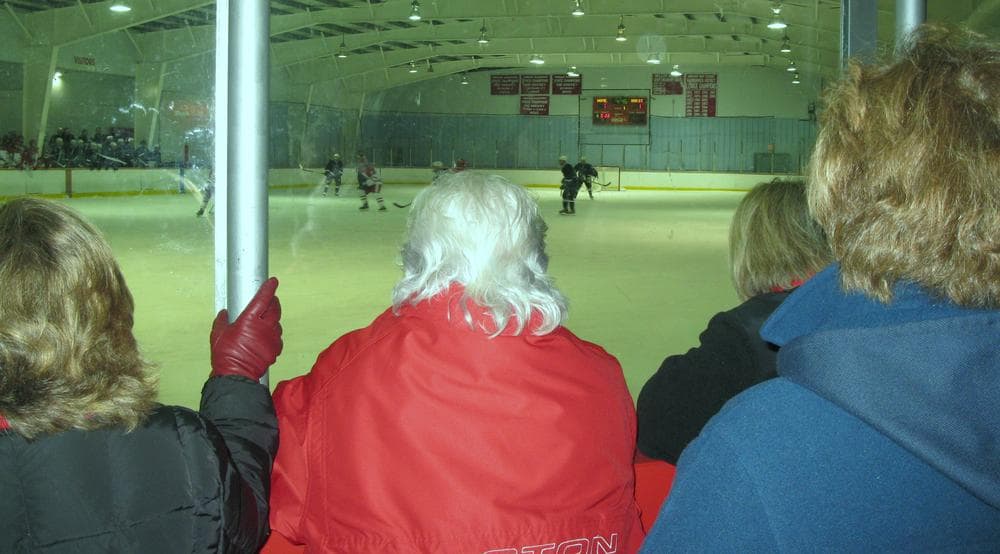Advertisement
Massachusetts Concussion Course Meets Resistance
ResumeMassachusetts is moving ahead with a strict new set of rules aimed at reducing head injuries, but some parents, administrators and students are pushing back. Critics are opposed to a requirement in the works that would mandate a course on concussions for all student athletes and their parents.
Some parents want the state to butt out, even when the state's aim is to protect their children from head injuries.
"I'm not too keen on the government being really into everything," Pat Lafond said.

Lafond pressed up against the plexiglass at the Pilgrim Skating Arena and watched her grandson play for the Hingham High varsity ice hockey team. The boys were slamming into the Marshfield team — and the partition.
"I do believe you need knowledge on concussions 'cause they've come a long way in discovering later in life that people have seizures, and so forth, but I don't want the government involved with it," Lafond said.
Hingham High School's athletic director, Margaret Connaughty, believes it would be hard to make parents take any course.
"So do we say to a student who has all of his paperwork in, has taken a concussion screening test, has attended my preseason meeting, and then do we say well, 'Parent didn't take this concussion test, so he can't play'?" Connaughty asked. "And, especially if it's a yearly thing so that every year it's something a parent and a student has to take, it's another mountain of paperwork."
Freshman and junior year, all athletes take a test of their memory and their reaction times. Hingham High athletic trainer Al Blaisdell explained that the results are compared to a second test after an athlete gets a head injury.
"It's a useful tool," Blaisdell said. "It's kind of like having an MRI before your shoulder hurts and then having one after it hurts."
Students must pass the test before they're allowed to play again. And, at the beginning of every sport's season, Blaisdell talks to athletes and their parents about how to recognize concussions.
Eight hundred of Hingham High School's 1,100 students play a sport. Tim Driscoll, one of the captains of the hockey team, doesn't think a course is going to make parents more aware of any potential symptoms of concussions in their children. Like many of the other young players gliding onto the ice at Pilgrim Arena, he's an expert at concussions. He's had four, the last one when he was 11 or 12.
He doesn't have any symptoms anymore.
"I think your coaches are the ones who should know," Driscoll said. "They're the ones who are going to tell if you're playing differently, or if you're out of it on the ice. Your parents, I think you'd tell them. I don't think you'd try to hide it from them."
"It's a useful tool. It's kind of like having an MRI before your shoulder hurts and then having one after it hurts."
Al Blaisdell, Hingham High athletic trainer
On the other hand, the proposed mandatory course does have its supporters. Tony Messina, the Hingham boys' hockey coach, is one of them.
"It takes the decision-making away from the coach," Messina said, "which is kinda what we like, because we were more apt in the past to say: 'Are you cloudy? Do you feel OK? Get back in there.' "
Messina thinks there's another reason to make players learn more about concussions.
"I don't think the players feel as concerned about it right now, and I think that might make them a little more concerned," Messina said.
Senior Alex Pompeo agrees with his coach. Pompeo has never had a concussion, and he admits he doesn't think about them a lot, but he supports being made to take a course.
"If you haven't had a concussion before, then you probably won't know what the symptoms are," Pompeo said. "I think it's a pretty good idea."
Some of the girls playing hockey would also like to see a mandatory course. Freshman hockey player Catherine Linehan once collided with another girl and whip-lashed on the ice. She sprained the ligaments in one of her neck vertebrae, and was out for three months.
She believes a course could help her figure out whether she should stay off the ice the next time she's injured.
"Sometimes the coaches and the players aren't on the same page, and a player could think it's bad and the coach is like, 'no, you're fine, go out,' or vice versa," Linehan said. "I think that's good — to be on the same page."
Linehan likes the idea of going onto the ice with a little more knowledge.
More:
This program aired on February 1, 2011.
